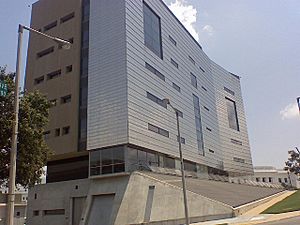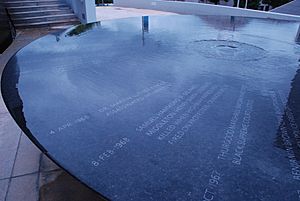Southern Poverty Law Center facts for kids
 |
|
| Founded | August 1971 |
|---|---|
| Founders |
|
| Type |
|
| Focus | |
| Location |
|
|
Area served
|
United States |
| Product |
|
|
Key people
|
Margaret Huang (President and CEO) Bryan Fair (Board Chairman) |
|
Revenue
|
$136.3 million (2018 FY) |
| Endowment | $471.0 million (2018 FY) |
|
Employees
|
421 in 2021 |
The Southern Poverty Law Center (SPLC) is a non-profit organization in the United States. It works to protect civil rights and fight against hate and injustice. The SPLC is based in Montgomery, Alabama.
It is well-known for taking legal action against white supremacist groups. The SPLC also identifies and tracks hate groups and other extremist organizations. A big part of their work is creating education programs that teach about tolerance. The SPLC was started in 1971 by Morris Dees, Joseph J. Levin Jr., and Julian Bond.
In 1980, the SPLC began suing groups like the Ku Klux Klan (KKK). They helped victims of violence get money for the harm they suffered. The SPLC also works on other civil rights issues. This includes fighting against racism and unfair conditions in prisons. They also work to stop discrimination against immigrants. The SPLC shares information about hate groups with the Federal Bureau of Investigation (FBI).
Since the 2000s, many experts and news groups use the SPLC's lists of hate groups. These are groups that "attack or hurt an entire class of people." The SPLC also lists anti-government extremist groups. Some people have criticized these lists, saying they are too broad or politically motivated.
Contents
- How the SPLC Started
- Who Leads the SPLC?
- How the SPLC is Funded
- Important Legal Cases by the SPLC
- Fighting for Fair Elections (1974)
- Stopping Klan Violence (1980)
- Protecting Vietnamese Fishermen (1981)
- Stopping Klan Harassment (1982)
- Bankrupting the KKK (1987)
- Holding White Aryan Resistance Accountable (1990)
- Suing the Church of the Creator (1994)
- Justice for a Burned Church (1998)
- Taking Down Aryan Nations (2000)
- Ten Commandments Monument (2002)
- Stopping Vigilante Groups (2003)
- Justice for Billy Ray Johnson (2007)
- Suing the Imperial Klans of America (2008)
- Improving Prison Conditions in Mississippi (2010, 2013)
- Fighting Online Harassment (2017)
- SPLC Projects and Publications
- Images for kids
- See also
How the SPLC Started

The Southern Poverty Law Center was founded in August 1971. Civil rights lawyers Morris Dees and Joseph J. Levin Jr. started it. Their first goals were to fight poverty, racial discrimination, and the death penalty. Julian Bond, a civil rights leader, was asked to be the first president. He stayed on the board of directors until he passed away in 2015.
In 1979, the SPLC began suing Ku Klux Klan chapters. They sued for money damages on behalf of victims. These lawsuits often led to the KKK and similar groups going bankrupt. The SPLC is known for finding new legal ways to weaken hate groups.
In 1981, the SPLC started its Klanwatch project. This project watched the activities of the KKK. Later, it grew into Hatewatch, which now monitors many types of hate organizations.
In 1989, the SPLC opened the Civil Rights Memorial. It was designed by Maya Lin. This memorial honors those who died during the Civil Rights Movement.
The SPLC started its "Teaching Tolerance" project in 1991. This project creates educational materials. In 2013, "Teaching Tolerance" was called one of the most widely read magazines. It focuses on diversity and social justice in education.
After 2016, the SPLC grew a lot. They hired many new employees. In March 2019, founder Morris Dees was fired. Later that year, the SPLC staff voted to form a union. This happened after some employees raised concerns about discrimination. Margaret Huang became the new president and CEO in February 2020.
The SPLC has also been involved in cases about prison conditions. In 2020, they asked for the release of many people in ICE custody. This was to protect them during the COVID-19 pandemic.
Who Leads the SPLC?
Margaret Huang became the president and CEO of the SPLC in February 2020. She used to be the Chief Executive at Amnesty International USA. Margaret Huang took over from Karen Baynes-Dunning. Karen Baynes-Dunning was an interim leader after Morris Dees was fired.
How the SPLC is Funded
The SPLC gets its money from donations. They do not charge fees to the clients they represent in court. They also do not take a share of any money awarded in lawsuits. The SPLC started saving money for its future in 1974. They believed that one day, non-profit groups might not get as much support through mail.
By 2017, the SPLC had almost half a billion dollars in assets. In 2018, their total funds were about $471 million. They spent 49% of their income on programs. By 2021, their total assets grew to $801 million.
Charity Ratings
As of 2023, Charity Navigator gave the SPLC four out of four stars. This is a very good rating for how they handle their money. The SPLC has received four-star ratings since 2019.
Also in 2023, the SPLC earned the GuideStar Gold Seal of Transparency. This shows they are open about their finances.
CharityWatch gave the SPLC a grade of B in 2023. However, CharityWatch lowers the grade for charities that save too much money. They lowered the SPLC's grade to an F because it had enough money saved to cover 7.3 years of its budget.
Important Legal Cases by the SPLC
The SPLC has taken on many important civil cases. They aim to stop harmful actions and win money for victims. The SPLC states that they do not keep any of the money awarded to their clients.
Fighting for Fair Elections (1974)
One of the SPLC's early cases was Sims v. Amos. The court ordered Alabama to change its election system. This decision helped fifteen Black lawmakers get elected in 1974.
Stopping Klan Violence (1980)
In 1979, the Ku Klux Klan attacked civil rights marchers in Alabama. A Black woman, Bernice Brown, was shot. The SPLC sued the KKK on behalf of Brown and other marchers. The lawsuit was settled in 1990. It made Klan members pay damages and stop white supremacist activities. This case helped weaken the KKK.
Protecting Vietnamese Fishermen (1981)
In 1981, the SPLC helped Vietnamese shrimpers in Texas. A KKK-linked group was harassing and threatening them. The Klan burned their boats and shot at them. The SPLC took the group to court. The court ordered the Klan to stop their actions. The SPLC also found a Texas law that banned private armies. The court used this law to close the Klan's training camp.
Stopping Klan Harassment (1982)
In 1982, armed KKK members terrorized a Black prison guard and his family in North Carolina. The SPLC filed a lawsuit, Person v. Carolina Knights of the Ku Klux Klan. In 1985, the court ordered the Klan leader, Frazier Glenn Miller Jr., to stop his group's paramilitary activities. He was also banned from harassing Black people or their white friends. Miller later broke the rules and went to prison.
Bankrupting the KKK (1987)
In 1987, the SPLC won a major case against the United Klans of America. This was for the lynching of Michael Donald, a Black teenager. The SPLC used a new legal strategy. They held the entire organization responsible for the crimes of its members. The court ordered the KKK to pay $7 million to Donald's mother. This forced the United Klans of America into bankruptcy. Their headquarters was sold to help pay the judgment.
Holding White Aryan Resistance Accountable (1990)
In 1988, members of a white supremacist group attacked and killed Mulugeta Seraw, an Ethiopian man. In 1990, the SPLC won a civil case for Seraw's family. The court ordered the group's leaders to pay $12.5 million. This forced the group, White Aryan Resistance (WAR), out of business.
Suing the Church of the Creator (1994)
In 1991, a Black U.S. Navy veteran was murdered by a member of a neo-Nazi group. The SPLC represented the victim's family. In 1994, they won a $1 million judgment against the group, then called the "Church of the Creator." The SPLC also sued another leader who tried to help the church avoid paying.
Justice for a Burned Church (1998)
In 1998, the SPLC won a $37.8 million verdict against two Ku Klux Klan chapters. This was for burning down the Macedonia Baptist Church, a historic Black church in South Carolina. This was the largest civil award ever for damages in a hate crime case.
Taking Down Aryan Nations (2000)
In 2000, the SPLC won a $6.3 million judgment against the Aryan Nations. This was after their guards attacked a woman and her son. As a result, the Aryan Nations leader had to give up his land. The land was then sold and turned into a "peace park."
Ten Commandments Monument (2002)
In 2002, the SPLC sued Alabama Supreme Court Chief Justice Roy Moore. He had placed a large monument of the Ten Commandments in the state judicial building. Moore was eventually removed from his position, and the monument was taken down.
Stopping Vigilante Groups (2003)
In 2003, the SPLC sued Ranch Rescue, a vigilante group. This group had assaulted and illegally held two immigrants near the U.S.-Mexico border. In 2005, the SPLC won judgments totaling $1 million against the group's leaders. The group's headquarters was seized and given to the victims.
Justice for Billy Ray Johnson (2007)
The SPLC helped Billy Ray Johnson, a Black man with a mental disability. He was severely beaten by four white men in Texas. In 2007, a jury awarded Johnson $9 million in damages.
Suing the Imperial Klans of America (2008)
In 2008, the SPLC sued the Imperial Klans of America (IKA). This was after Klan members attacked a 16-year-old boy of Panamanian descent. A jury awarded the boy and his mother $2.5 million in damages.
Improving Prison Conditions in Mississippi (2010, 2013)
The SPLC has filed lawsuits to improve conditions in Mississippi prisons. In 2010, they sued over poor conditions at a youth prison. This led to the state ending its contract with the private company running the prison. In 2013, they sued again over conditions at another prison.
Fighting Online Harassment (2017)
In 2017, the SPLC sued Andrew Anglin, who runs a white supremacist website. Anglin had encouraged an online harassment campaign against a woman. In 2019, a judge ordered Anglin to pay $14 million.
SPLC Projects and Publications
Hate Map
Since 1990, the SPLC has published a yearly list of hate groups in the U.S. These groups "attack or harm an entire class of people." The SPLC says hate group activities can include speeches, rallies, and publishing. Not all these activities are illegal.
The SPLC's lists of hate groups have caused some debate. Some people say the SPLC's definitions are too broad. However, the SPLC stands by most of its listings.
SPLC Hatewatch Blog
The Hatewatch blog started around 2007. It shares the work of investigative journalists who watch and expose the "radical right" in America. It grew from the "Klanwatch" project, which began in 1981 to monitor the KKK. Hatewatch helps show the SPLC's work.
A 2018 Hatewatch report looked at how false crime statistics are used by hate groups. It showed how these false ideas can lead to violence. For example, the report mentioned how Dylann Roof, who committed a mass shooting, was influenced by false information about "black-on-white crime."
Teaching Tolerance

The SPLC runs the website Tolerance.org. This site offers news on tolerance, educational materials for children, and resources for teachers. It has won awards for its activism.
Anti-LGBTQ+ Hate
In 2023, the SPLC released a report about anti-LGBTQ+ hate. It explained how some groups use false science to spread hate.
Documentaries
The SPLC also makes documentary films. Two of their films have won Academy Awards: A Time for Justice (1994) and Mighty Times: The Children's March (2004).
Working with Law Enforcement
The SPLC works with police and other law enforcement agencies. They offer training on the history and activities of extremist groups. The FBI has partnered with the SPLC to share information and address hate crimes.
Publications
The SPLC publishes several materials.
Intelligence Report
Since 1981, the SPLC's Intelligence Project has published a quarterly Intelligence Report. This report tracks what the SPLC calls radical right hate groups and extremists in the U.S. It provides information on these groups' efforts and methods. Many scholars use it as a reliable source on U.S. right-wing extremism.
The Intelligence Report has won awards for its journalism. Since 2001, the SPLC has released an annual report called Year in Hate and Extremism. It shares statistics on the number of hate groups in America.
Immigration
The SPLC also studies and publishes on immigration issues. They have described certain guest worker programs as being "close to slavery."
Images for kids
-
The Civil Rights Memorial in Montgomery
-
Closeup of the Civil Rights Memorial
See also
 In Spanish: Southern Poverty Law Center para niños
In Spanish: Southern Poverty Law Center para niños
 | Audre Lorde |
 | John Berry Meachum |
 | Ferdinand Lee Barnett |




